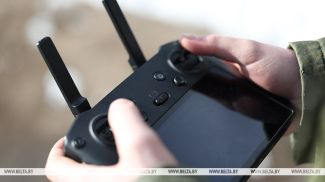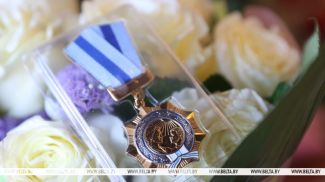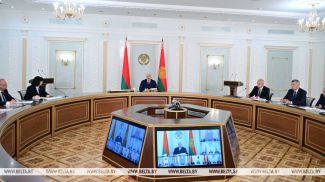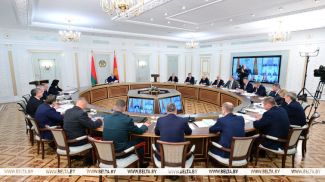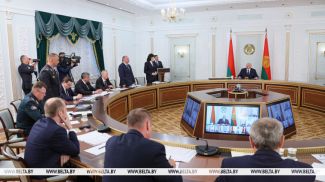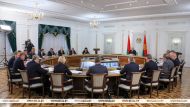The other day Aleksandr Lukashenko announced he would meet with his Russian counterpart Vladimir Putin. The implementation of integration projects is likely to become one of the topics of the presidents' talks. The sides had previously agreed that Russia would lend $1.5 billion to Belarus for manufacturing import-substituting products. What goods will Belarus produce at Russia's request, who really benefits from this, and why is it better for both countries not to stop there? The project After the Fact: Lukashenko's Decisions tries to figure it out.
Why did Belarus and Russia decide to work together to substitute imports?
Unfortunately or fortunately, but life itself has forced Belarus and Russia to jointly take care of import substitution. Lukashenko has long been proposing to the Russian side to move in this direction, but back in the day Russians thought straightforwardly and did not really think about the future: "We have energy resources, which means we have money. Which means we can buy anything."
And this is quite logical and justified. When you have billions, why bother with trifles? Why, figuratively speaking, do you have to reinvent the bicycle when the West has already invented it and is ready to deliver it to you in the best possible way?

But that is valid if you don't think about the long perspective. When sanctions hit Russia this year, Western companies decided not to take risks and pulled out from the explored market. They left the figurative bicycle. But they took the steering wheel, pedals, and chains with them.
“We didn't really want foreigners to operate here. This is why the imposed sanctions didn't hit us as hard as, say, KamAZ. That kind of business was primarily exploited by Germans first of all. We didn't particularly entertain these ideas in our machine building industry. Germans worked with us, too. We had MAZ-MAN and Neoplan at MAZ back in the day. Once the contract was over, I shook hands with them, thanked them and said we would take it from here. Whatever it may cost us, whatever difficulties and complications we may face. By the way, we suggested such cooperation options to Russia, too. Back then your leaders believed that if Germans or Americans came, they would bring amazing technologies and everyone would be so happy…” the head of state said in March while talking about the secrets hidden behind today's processes.
What import substitutes does Russia need?
Import substitution had become one of the main items on the negotiating agenda by spring. The sides agreed that Belarus, which has broad competencies, could lend a shoulder to Russia in this matter. To do this, of course, the republic needs to increase or modernize production. The governments prepared their proposals and decided on the approximate volume of required investments. Visits of Russian governors could be used as an indicator of how much all these matters really worried Russia. They came to Minsk with impressive lists of products that had been previously supplied to their regions by Western partners. And now these imports needed substitutes in a hurry.
“800 items. These are, first of all, products ranging from gas burners to more serious things. A large amount of the imports we used to buy in Europe can be substituted thanks to capabilities of the Republic of Belarus. We desperately need the list of products that we see," Governor of Russia's Penza Oblast Oleg Melnichenko told reporters after meeting with Aleksandr Lukashenko in March.
And Belarus had long been prepared! The fact even surprised Prime Minister of Russia Mikhail Mishustin the other day. At an agribusiness expo held in Moscow Oblast he demanded that Russian producers replace all imported components with domestic ones. But then it turned out that the components had come from Belarus. “From Belarus? Very good! In this sense, consider that you have solved the problem. This is the Union State, our friends and partners,” Mikhail Mishustin remarked.
What are prospects of Belarusian enterprises on the Russian market?
It is now known that Russia will provide Belarus with a preferential loan to the tune of $1.5 billion for the implementation of import substitution projects. Meanwhile, the republic has much more ambitious ideas. Many Western companies have left the Russian market, but it opened up a multi-billion dollar niche for the Union State in terms of import substitution, the Economy Ministry believes.
Belarusian Deputy Economy Minister Dmitry Yaroshevich told the Respublika newspaper in an interview: “Additional opportunities for substituting imports to the tune of over $11 billion opened up due to the withdrawal of a number of foreign companies from the Russian market. For instance, there is a huge potential in the woodworking industry for us. IKEA Company has left the Russian market, leaving a niche of $1 billion! Today capabilities of Belarusian furniture makers are estimated at $400 million, which makes up 40% of the vacant market niche.”
There are similar examples in the light industry, too. For example, today the capacity of the market of footwear, clothing and accessories in Russia is up to $100 billion. The substitution potential of domestic producers is several times lower – it is estimated at $600 million. However, it can be significantly increased if small and medium-sized businesses get involved. There are almost 2,000 of them, the Economy Ministry noted.
Georgy Grits, professor, candidate of economics, pointed out: “Thank god, there is common sense and there is no mass exodus of foreign companies from Belarus. We are talking about hundreds of billions of U.S. dollars since a number of companies have withdrawn from the Russian market. But you have to understand that the market took years to evolve.”
How will Belarus spend the $1.5 billion Russian loan?
Russia will lend $1.5 billion to Belarus for import substitution projects. The money will be channeled into the development of existing industries. Belarus has proposed more than a dozen projects to Russia, they are going through the approval process. Most of the money will be allocated to mechanical engineering enterprises, the rest will be allocated to microelectronics.
“Verification of business plans is underway. We are looking at specific projects to find out whether they will be funded or not. Only two projects have been authorized already. Those are BelAZ (a ring-rolling enterprise) and another one. $1.2 billion for civilian projects. Another $200 million for military projects. Those will be primarily microelectronic projects. Virtually all the projects are mechanical engineering ones,” Prime Minister of Belarus Roman Golovchenko told BelTA.

BelAZ is building the ring-rolling complex in Orsha at premises of the company's automatic control equipment plant. By the way, Belarus has started financing this project on its own without waiting for the loan. When Russian assets become available, they will simply be added to the investment pool, Roman Golovchenko explained.
Now BelAZ will have to work as hard as three enterprises. BelAZ was not the only company to sell mining vehicles in Russia in the past. There were assembly enterprises of an American company and a Japanese one. Apart from that, the Japanese intended to set up another assembly enterprise in Russia. They have already shut down these ventures, this is why Belarusians have to fill the market niche now. Certainly, BelAZ will have to increase its output of mining vehicles. Additional resources are needed. The situation is similar as far as the production of road construction and maintenance vehicles, municipal vehicles is concerned.
The Industry Ministry clarified that the second authorized project is the production of timber harvesting machines by the Belarusian company Amkodor. “The market was full of competition in the past. Now Amkodor is essentially the only manufacturer in the Union State of Belarus and Russia,” noted Yegor Chernyavsky, Head of the Central Office for Foreign Economic Relations of the Industry Ministry.
Yegor Chernyavsky stressed: “We should probably talk not about the size of the sum but about the importance of support in current conditions when sanctions-fueled restrictions create rather high barriers for taking out loans. In other words, I'd prefer to talk not about the size of the loan but about the importance and timeliness, about the cost of these credit resources. After all, the Russian Federation offers them on rather advantageous terms. The money is offered at rather good interest rates. And we see that the product we are going to ultimately sell will be competitive.”
Belarus' machine-building giants – MTZ and Gomselmash – also intend to join import-substituting projects. Smaller companies like Minsk Gear Plant, Minsk Bearing Plant intend to follow suit.

Minsk Mechanical Plant is implementing an ambitious project. It is developing ABS and EBS systems of brake gear for automobiles and trailers of Belarusian and Russian make. It is assumed that these products will be used for heavy trucks, buses, trolleybuses and agricultural machines. The company intends to start the first trials of the ABS system by the end of the year. The EBS system will be ready in another year. Proprietary resources and borrowed funds will be used to finance the project.
Most of the manufacturing capacity of a factory located in Rudensk, Minsk Oblast will be used to make headlights and lamps for Russian automobiles. The company's output capacity is huge. It can provide the home market with headlights and satisfy much of the demand of the Russian automotive industry.
Who are the key buyers of Belarusian microchips?
The Belarusian company Integral has been entrusted with a special responsibility. The company manufactures various microelectronic components. You may be surprised to learn that Belarusian microcircuits can be found even in household appliances of famous manufacturers. It is most likely that the charger for your phone has also been assembled using these parts.
Truth be told, the Russian side is more concerned about the space industry and the military-industrial complex. Therefore, it is not surprising that the main consumers of Belarusian microelectronic products on the Russian market are enterprises of Roscosmos, Rosatom, and the Defense Ministry.
“Rockets have to fly to outer space. Defense missiles have to fly. Such as air defense missiles, surface-to-surface missiles and so on. Missiles based on submarines and missiles carrying nuclear warheads. Will we be able to make it to ensure the uninterrupted operation of the defense sector, the civilian sector of the Union State? It is a most pressing matter now,” Aleksandr Lukashenko stressed at a government conference held in June to discuss the state and development of the microelectronics industry.

Belarusian enterprises already have to operate in three shifts to meet the needs of the Russian market. This means that they have an opportunity to make good money, raise salaries for their workers and modernize their production facilities using the allocated funds. In fact, $1.5 billion is not such a large amount of money to satisfy all the needs of the Russian side. Therefore, the financing of Belarusian enterprises, especially in the form of a loan, is also beneficial for Russia. But as far as microelectronics is concerned, the money allocated for these projects is not that large, experts noted.
Georgy Grits remarked: “Digitization is a global trend these days. Digitization involves software and hardware. Hardware is based on microchips, hybrid microcircuits. Russia has a similar program running till 2025. Its funding is estimated at about $60 billion according to various formats. The European Union intends to spend $53 billion, the United States of America about $55 billion. Meanwhile, China is investing $1.300 trillion in microelectronics in order to dodge restrictions. But they have a slightly different goal: to create fully integrated production.”
If our countries had engaged in import substitution several years ago, as the Belarusian side suggested, then today, as we look at more and more sanctions, we would only laugh at attempts of the West to knock us off the beaten track. Lessons need to be learned on time. We hope that today's policy and focus on a common result will not become a one-time action, but will lay the foundation for new traditions that bring us even closer together.
The project has been created using the target levy for the production of national content.




